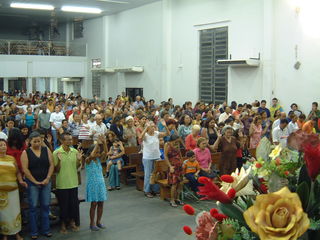Many people seek out prayer for healing by attending church services or Christian conferences advertised as offering special healing prayers. What motivates people to attend such events, and what do they experience during and after prayers?
Written surveys shed light on how supplicants perceive sickness, prayer, and healing. But there are some questions that survey data cannot answer—such as whether prayer "really" results in healing, or whether there is a “God” who answers prayer. It is important to remember that both religion and science are ways of constructing what is real in the world rather than offering transparent windows onto reality. Surveys are useful in studying how people who offer and receive prayers for healing socially construct their understandings of healing prayer.
Whether or not the perceptions of prayer participants square with empirical measurements—such as medical tests conducted before and after prayer—people’s perceptions matter to individual and group beliefs and behaviors. According to the well-known Thomas Theorem in sociology, if people “define situations as real, they are real in their consequences.” People’s religious beliefs and practices often have real world effects that can be quite enduring.
In one set of surveys I carried out, I collected responses from 921 North American, European, and Brazilian participants in pentecostal conferences using a 27-question “Healing Survey” (in English and Portuguese). The survey asked about previous healing experiences, current need for healing, use of medical and spiritual approaches besides prayer, and whether healing was perceived during the current conference.

Most respondents remembered a time in their lives when they perceived that God had healed them of a physical problem. Even relatively minor healings—such as back pain—were described as memorable events. A British man recalled in 2007: “I had muscle spasms in my upper back with pain about 35 yrs ago and was prayed over and received total healing in the mid 70s.” From this man’s perspective, relief from back pain was an unforgettable experience, not a trivial one.
Most survey respondents (seventy-two percent) said they had a current need for healing. Relatively few people reported life-threatening conditions—only one percent had been diagnosed with cancer—but most people indicated that they were suffering from some non-trivial problem. The most common complaint (thirty-seven percent of problems described) was pain. For instance, one respondent reported a pain level of “10” on a 0-10 scale with 10 being the worst. This respondent explained: “my back hurts. It has been years that I don’t know what it is to live without this pain and my shoulder hurts too.” A dismissive medical evaluation—from a doctor who “said that there was nothing wrong with me"—intensified the suffering experienced.
More than half of the people who returned surveys (fifty-two percent) said that they experienced improvement of a physical problem during the surveyed event. Relatively few of these people were merely “claiming healing by faith.” For the most part, pentecostals surveyed only reported “healing” if they noticed an improvement in symptoms—their pain level diminished, or they could move some part of their body in a way they couldn’t before prayer. Some scholars have argued that people with major health problems typically claim to receive minor physical or “spiritual” healings so that they won’t have to admit failure. My research did not bear this out. The typical respondent claiming healing reported being “almost completely” healed from pain related to the same physical problem she came to the conference wanting to have healed.
Few respondents worried that asking for prayer repeatedly might show “lack of faith.” Rather, they asked prayer over and over again—and often reported further improvement the more prayer they received. One Brazilian woman reported that “I fought with a reading problem from 2002 to 2004 and I was healed at a prayer marathon after being prayed for 49 times.” This woman demonstrated her faith by persevering in seeking prayer until her problem was resolved.
Popular assumptions about “faith healing” notwithstanding, I found that people who self-reported high faith were no more likely to experience healing than those who admitted weak faith. Neither were people with lower education or economic levels more likely to report healing. Despite stereotypes of anti-medical pentecostals, most pentecostals surveyed went to doctors and viewed medicine and prayer as complementary.
Those reporting healing explained the experience as tangible evidence of God’s love and power. People spoke of “God’s Power—love,” “the love of God,” “God’s great love,” and “the love of Christ for me.” People perceived God to be the source of healing, and they interpreted personal healing experiences as evidence of God’s concern for them as individuals. This perception, as we will see in future posts, can be highly motivational.


